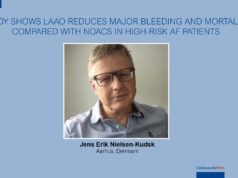
Sripal Bangalore (New York University Grossman School of Medicine, New York, USA) presented the results of a late-breaking meta-analysis of randomised trials (including the recently published ISCHEMIA and ISCHEMIA-CKD) that compared routine revascularisation with an initial conservative strategy at PCR e-Course 2020.
Bangalore made the point that revascularisation is often performed in patients with stable ischaemic heart disease (SIHD) to improve survival, prevent other cardiovascular events and improve quality of life. A press release from PCR emphasises that it remains uncertain whether revascularisation reduces death and other cardiovascular outcomes.
Cumulative evidence from this meta-analysis, which includes data from 14 randomised controlled trials and 14,877 patients followed for a weighted mean of 4.5 years, suggests routine revascularisation when compared to initial medical therapy, results in similar survival; reduced non-procedural myocardial infarction; reduced unstable angina; but greater freedom from angina at the expense of higher rates of procedural myocardial infarction.
Previous trials have not shown a mortality benefit with the use of revascularisation over medical therapy, but Bangalore told attendees that guidelines continue to recommend revascularisation to improve survival in certain anatomic subgroups of patients.
With regard to methodology, the investigators excluded trials that enrolled patients within 48 hours of acute coronary syndrome and also those that only enrolled post myocardial infarction patients (such as ALKK and SWISSI-2).
Bangalore outlined that trials were categorised as “no stent” trials if less than half of the patients in the intervention group received a stent, whilst they were grouped into “stent” trials if half or more of patients received a stent. Further, trials were categorised into “no statin” trials if less than half of the patients in the medical therapy group received a statin and as “statin” trials if half or more of the patients in the medical therapy group received a statin. Statistical analysis was performed on an intention-to-treat basis stratified by “stent” vs. “no stent” trials
The outcomes that the researchers looked at included death, cardiovascular death, both procedural and non-procedural myocardial infarction, overall myocardial infarction, unstable angina, heart failure, stroke and freedom from angina.
“The risk benefits of routine revascularisation versus initial medical therapy should be used in shared decision making for the management of patients with stable ischaemic heart disease. Longer-term follow-up of trials is needed to assess whether reduction in non-fatal spontaneous events improves long-term survival,” the press release advocated.
Bangalore qualified that the limitations of the dataset included clinical heterogeneity in the studies despite lack of statistical heterogeneity for most endpoints. He also pointed to the variability in the definitions of outcomes, especially for myocardial infarction.
Davide Capodanno (Catania, Italy and new editor-in-chief of EuroIntervention) led the discussion.












